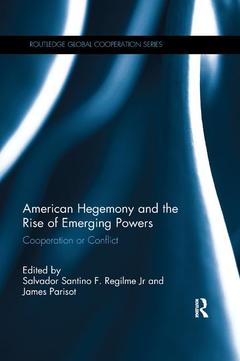American Hegemony and the Rise of Emerging Powers Cooperation or Conflict Routledge Global Cooperation Series
Coordonnateurs : Regilme Salvador Santino, Parisot James

Over the last decade, the United States' position as the world's most powerful state has appeared increasingly unstable. The US invasions of Afghanistan and Iraq, non-traditional security threats, global economic instability, the apparent spread of authoritarianism and illiberal politics, together with the rise of emerging powers from the Global South have led many to predict the end of Western dominance on the global stage. This book brings together scholars from international relations, economics, history, sociology and area studies to debate the future of US leadership in the international system. The book analyses the past, present and future of US hegemony in key regions in the Asia-Pacific, Latin America, Middle East, Europe and Africa ? while also examining the dynamic interactions of US hegemony with other established, rising and re-emerging powers such as Russia, China, Japan, India, Turkey and South Africa.
American Hegemony and the Rise of Emerging Powers explores how changes in the patterns of cooperation and conflict among states, regional actors and transnational non-state actors have affected the rise of emerging global powers and the suggested decline of US leadership. Scholars, students and policy practitioners who are interested in the future of the US-led international system, the rise of emerging powers from the Global South and related global policy challenges will find this multidisciplinary volume an invaluable guide to the shifting position of American hegemony.
Part 1: Analytical and Theoretical Perspectives: US Hegemony and Emerging Powers
Debating American Hegemony: Global Cooperation and Conflict
Salvador Santino F. Regilme Jr & James Parisot
1. Stronger than Strong: Perceptions and Misperceptions of Power
Jeff Bridoux
Part 2 Emerging Powers and Global Economy
2. Trade and security in US grand strategy vis-à-vis China
Michiel Foulon
3. Financial centres and RMB internationalization: prospects for a post-American monetary order?
Julian Gruin
4. The Rise of Emerging Markets Signifies the End of the Beginning of the American Century: Henry Luce and the Emergence of Global Capitalism
Sean Starrs
Part 3 US Hegemony and Rising Powers in Various World Regions
5. The Travails of Semi–Sovereignty: Japan’s Dilemma in the Era of Trump
Walden Bello
6. No Conflict by Invitation: Japan’s China Balancing amidst US Relative Decline
Giulio Pugliese
7. Turkey as a ‘Rising Power’: Rethinking the US-Turkey Relations
Digdem Soyaltin & Didem Buhari Gulmez
8. A Narrative for Cooperation with Rising India – An Analysis of a US Think Tank
Carina van de Wetering
9. Conflicted identities: Implications of South Africa’s rise on U.S. security policy in Africa
Obert Hodzi
10. China and Latin America
Rhys Jenkins
11. Russia’s Challenge to US Hegemony and the Implications for Europe
Maxine David
Conclusion: The Future of Global Cooperation and Conflict
Salvador Santino F. Regilme Jr & James Parisot
Salvador Santino F. Regilme Jr is an Assistant Professor of International Studies at the Institute for History at the University of Leiden, the Netherlands. He holds a joint PhD in Political Science and North American Studies from the Free University of Berlin, Germany, and he previously studied at Yale, Osnabrück, Göttingen and De La Salle Manila.
James Parisot received his PhD in Sociology from Binghamton University, USA, and is part-time Faculty in the Department of Sociology at Temple University, USA. He has published articles in journals including, among others, Third World Quarterly, International Critical Thought and the Journal of Historical Sociology.
Date de parution : 03-2019
15.6x23.4 cm
Date de parution : 10-2017
15.6x23.4 cm
Mots-clés :
Chinese FDI; RMB Internationalization; American dominance; Neoclassical Realists; Emerging markets; Chinese Government; Global South; Country’s Nuclear Capability; US; Global Monetary System; US foreign policy; AIIB; US hegemony; American Decline; international political economy; Turkish American Relations; international relations; Offshore RMB; Salvador Santino F; Regilme; South Africa’s Identity; James Parisot; Emerging Power Status; Jeff Bridoux; Didem Buhari Gulmez; Michiel Foulon; Comprehensive Nuclear Test Ban Treaties; Julian Gruin; American Led World Order; Sean Starrs; Saic Motor; Walden Bello; American Grand Strategy; Giulio Pugliese; post-World War II International System; Digdem Soyaltin; CIA Project; Turkish Foreign Policy; Carina van de Wetering; Luce’s Vision; Obert Hodzi; Constructivist International Political Economy; Rhys Jenkins; Neoclassical Realist Model; Maxine David; South Africa’s Foreign Policy; Neoclassical Realist Framework



